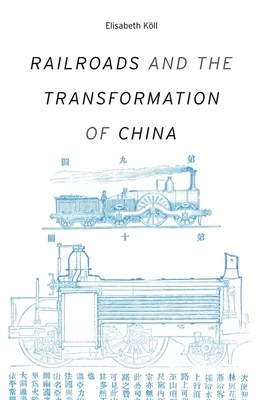

 Harvard University Press
Harvard University Press
Railroads and the Transformation of China


Key Metrics
- Elisabeth K�ll
- Harvard University Press
- Hardcover
- 9780674368170
- 9.3 X 6.1 X 1.6 inches
- 1.65 pounds
- History > Asia - China
- English
 Secure Transaction
Secure TransactionBook Description
As a vehicle to convey both the history of modern China and the complex forces still driving the nation's economic success, rail has no equal. Railroads and the Transformation of China is the first comprehensive history, in any language, of railroad operation from the last decades of the Qing Empire to the present.
China's first fractured lines were built under semicolonial conditions by competing foreign investors. The national system that began taking shape in the 1910s suffered all the ills of the country at large: warlordism and Japanese invasion, Chinese partisan sabotage, the Great Leap Forward when lines suffered in the battle for steel, and the Cultural Revolution, during which Red Guards were granted free passage to make revolution across the country, nearly collapsing the system. Elisabeth K�ll's expansive study shows how railroads survived the rupture of the 1949 Communist revolution and became an enduring model of Chinese infrastructure expansion.
The railroads persisted because they were exemplary bureaucratic institutions. Through detailed archival research and interviews, K�ll builds case studies illuminating the strength of rail administration. Pragmatic management, combining central authority and local autonomy, sustained rail organizations amid shifting political and economic priorities. As K�ll shows, rail provided a blueprint for the past forty years of ambitious, semipublic business development and remains an essential component of the PRC's politically charged, technocratic economic model for China's future.
Author Bio
Elisabeth Köll pursued her undergraduate education at the University of Bonn in Germany and at Fudan University, Shanghai. She received her Ph.D. in Chinese Business History from Oxford University where she was a Rhodes Scholar. Based on prior teaching experience in the setting of a history department as well as a business school, Elisabeth’s course portfolio includes courses on Chinese business, economic, and social history as well as on doing business in contemporary China.
Trained as a historian of modern China, Köll specializes in the business and socioeconomic history from the mid-19th century to the late 20th century, with a particular focus on the role and transformation of institutions in China’s evolution from empire into a modern nation-state. Her first monograph From Cotton Mill to Business Empire: The Emergence of Regional Enterprises in Modern China (Harvard East Asian monograph series, 2003) analyzes the history of industrial textile production at the Dasheng mills, one of China’s first incorporated enterprises, the firm’s managerial and financial evolution, and its impact on the regional economy, society, and politics.
Her recent book Railroads and the Transformation of China (Harvard University Press, 2019) uses the Chinese railroad system as a prism to explore the development of railroads as business and administrative institutions in China from the late nineteenth century to the 1980s. Examining the social, economic, cultural, and political functions of railroads, Köll's study addresses questions of how and to what extent railroads affected China’s development throughout the twentieth century, and conversely, how China’s development shaped the railroad itself as a bureaucratic and economic system.
Köll's current research for a new book project on "Pawnbroking and Informal Finance in Modern China" explores China’s role in the global history of informal finance and the different paths of transitioning to modern banking institutions. She is also writing a book for a general audience with the working title "An American Salesman in China: Business and Society in the Globalizing Economy of the 1920s". Based on the archival collection of a former cigarette sales agent in North China, this study will present China's business environment prior to WWII and discuss the opportunities, challenges, and competition from the perspective of Chinese and Western firms.
Source: University of Notre Dame Department of History
Videos
No Videos
Community reviews
Write a ReviewNo Community reviews